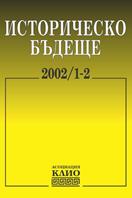Българският Хронограф
The Bulgarian Chronograph
Author(s): Ljudmila GorinaSubject(s): History
Published by: Асоциация Клио
Keywords: Bulgarian Chronograph; Old-Russian chronicles; John Malala; Georgius Amartolus; Pseudocallisthenes; Josephus Flavius; History of the Judaean War; Register of Bulgarian Khans; John Exarch; Alexander of Macedon
Summary/Abstract: The article examines the problem of the existence of an extensive Bulgarian miscellany to which, independently of one another, compilers of Russian historical works resorted. Although the Bulgarian Chronograph has not been preserved as a separate record, the author produces convincing evidence of its existence. For that purpose the composition of three Old-Russian chronicles – the Archival Chronograph, the first version of the Hellenic Chronicler and the Chronicle of Galicia and Volhynia – is subjected to analysis, explaining in this way the problem of the structure of the Bulgarian written record, formed by the texts of the Holy Scripture, John Malala and Georgius Amartolus’s Byzantine chronicles, Pseudocallisthenes’ Alexandria and Josephus Flavius’ History of the Judaean War. In the author’s opinion its corpus consisted of several chronological parts: the main part, in which the books of the Bible and the Register of Bulgarian Khans were incorporated; the part which incorporated the seventh book of Malala’s chronicle and Alexandria; Alexandria itself, joined to the text about the ancient men of wisdom, the rahmans; John Exarch’s Hexameron together with interpolations from the works of John Chrysostom; and a minipart formed by the story from Georgius Amartolus’s chronicle about Alexander of Macedon entering Jerusalem, interpolated in Alexandria. As the most conclusive evidence of the existence of the Bulgarian Chronograph is cited the fact that in Old-Russian sources the Register of Bulgarian Khans was joined to the Books of Kings of the Old Testament, which could be the deed only of a Bulgarian author. Besides, all written records indicated as its components had chronograph versions. To prove her thesis the author also subjects to precise analysis the ideological and informative content of the particular parts of the Bulgarian written record and reaches the convincing conclusion that the Chronograph compiled at the time of Prince Simeon was not at all a mosaic of information about world history, but an ideologically unified work joined together by global ideas.
Journal: Историческо бъдеще
- Issue Year: 2002
- Issue No: 1-2
- Page Range: 148-177
- Page Count: 30
- Language: Bulgarian
- Content File-PDF

